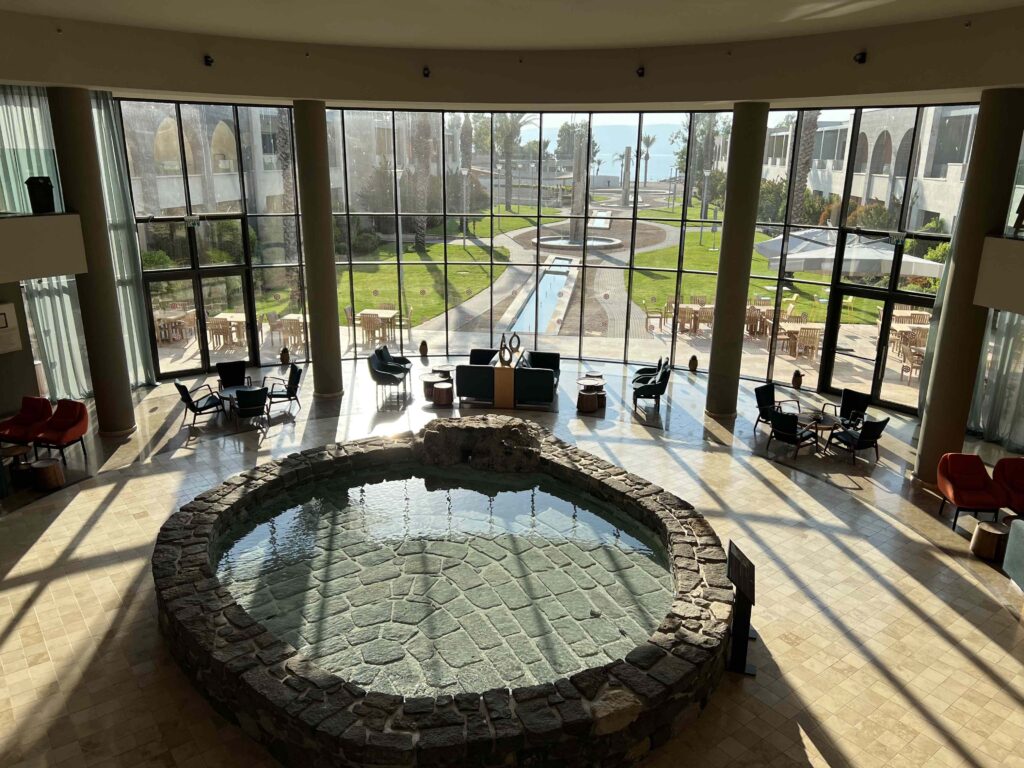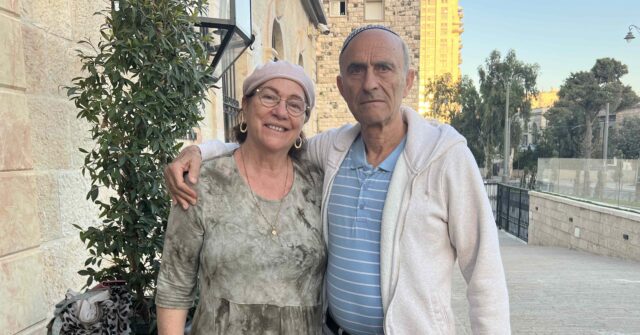MAGDALA, Israel — The grounds of the new Magdala Hotel, on the shores of the Sea of Galilee, are magnificent. A first-century synagogue — the oldest discovered and excavated in the Galilee — sits outside the lobby, as does a new cathedral near the pool.
The dining room overlooks an ancient pond used in the time of Jesus for salting fish. And a path leads to the sea itself, offering swimmers a chance to refresh themselves in Israel’s magnificent freshwater lake.

The atrium of the Magdala Hotel, featuring a reconstructed salting pond from the first century, with the Sea of Galilee in the background. Magdala, Israel, July 29, 2024 (Joel Pollak / Breitbart News)
But for dozens of guests, life in this paradise has become anxious and tiresome: they are not here by choice. They are among Israel’s 60,000 internal refugees, forced out of their homes in communities near the northern border, where Hezbollah has been firing anti-tank missiles, rockets, and drones since October 7.
On Saturday, a Hezbollah rocket killed twelve children in the Druze Arab village of Majdal Shams in the Golan Heights, underlining the severe danger.
“I’m dying to go home,” an elderly woman, who declined to be named, told me. She and the other refugees at the hotel are from a small kibbutz called Yir’on, just south of the border. Their expenses are paid by the government, but they cannot travel easily outside the hotel, which is in a remote location north of the city of Tiberias. They were forced to leave jobs and businesses behind, and they worry about what will happen to the children when the school year starts.
The same story is repeated at hotels throughout Israel.
In Jerusalem, I spoke with a married couple from the northern city of Kiryat Shemona, two of the 80 refugees at the Lady Stern hotel near the central bus and train stations. David and Bathsheba — whose three grown children also have names from the Book of Samuel — are grateful to be in the holy city. But they live in close confines, with little space for themselves and their clothes, and they yearn to go home.
Bathsheba describes the experience as a test of faith and community. While she has enjoyed building closer ties to her neighbors, many of whom — like her — are religious, she has had enough and wants to return.
“I’m not afraid of Hezbollah,” she tells me. “They are the stick that God is beating us with, as He has throughout history.” She believes that Israelis are being punished for failing to love one another. But she adds: “I have hope. I am optimistic.”
Israelis wonder how much longer the internal exile can continue, especially as it implies a loss of sovereignty over the northern border. Hezbollah’s attack against Majdal Shams, many believe, offers a chance for Israel to take military action in response, and push the Iranian-backed terrorists away from the border, northward of the Litani River.
On the other hand, a war would be costly, in life and treasure. So for now, Israel — and her refugees — wait in paradise.
Joel B. Pollak is Senior Editor-at-Large at Breitbart News and the host of Breitbart News Sunday on Sirius XM Patriot on Sunday evenings from 7 p.m. to 10 p.m. ET (4 p.m. to 7 p.m. PT). He is the author of “ ”The Agenda: What Trump Should Do in His First 100 Days,” available for pre-order on Amazon. He is also the author of “ The Trumpian Virtues: The Lessons and Legacy of Donald Trump’s Presidency,” now available on Audible. He is a winner of the 2018 Robert Novak Journalism Alumni Fellowship. Follow him on Twitter at @joelpollak.








